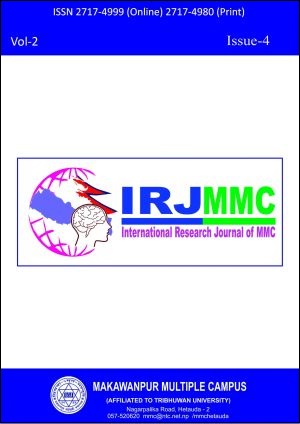Magical Aspects in Chandra Shyam Dangol's Stone Sculptures
DOI:
https://doi.org/10.3126/irjmmc.v2i4.41553Keywords:
Enlightenment, Magical, Mystical, Myth, Spirituality, SymbolAbstract
Chandra Shyam Dangol's stone sculptures are magical and mystical suggesting supernatural and spiritual aspects related to wisdom and enlightenment. Unusual images and symbols have been put together. On the surface level, the combination appears strange and contrary but as we go through the myths related to the artworks, we find the underlined logic and coherent composition. The recurrent icons, images and symbols are the figures of deities, lotus, mudras (gestures) and asanas (postures) of meditating characters that are combined in an unusual manner. They provide a sense of miraculous and thrilling spiritual experience. Breaking the monotony of mundane material existence, the works renew our perception. The aesthetic experience leads toward the awareness of the self and the universe and inspires for the harmonious existence of the individual in the world. Because of the mythical and spiritual contents, the sculptures appear to be mystical. The research area covers the stone sculptures of Chandra Shyam Dangol. About a dozen sculptures have been observed for the research but only four works have been interpreted in this paper. The paper attempts to trace the magical elements in his compositions and throw light on their significance. The study follows the qualitative research method to support the thesis statement since the interpretation of artworks may be multiple depending on viewers, time and place.
Downloads
Downloads
Published
How to Cite
Issue
Section
License
This license enables reusers to distribute, remix, adapt, and build upon the material in any medium or format for noncommercial purposes only, and only so long as attribution is given to the creator.

